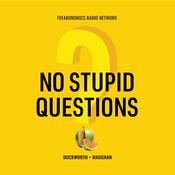54 episodes
- Are you going through “a very Chinese time in your life”? If so, maybe you’re one of the many American social media users who’ve jumped on the Chinamaxxing trend (or…you’re Chinese). But it’s more than just slippers in the house and hot water at breakfast — as Western netizens experience increased surveillance and censorship across internet platforms, they are ironically turning to one of the most repressive regimes in the world for respite. On today’s episode, Morgan talks to Yi-Ling Liu, author of The Wall Dancers: Searching for Freedom and Connection on the Chinese Internet, about the Chinese government’s history of internet censorship, how online creativity has still flourished inside China’s “walled garden,” and what Americans have to learn from our neighbors in the East.
Guest: Yi-Ling Liu, writer and editor
Further Reading/Listening:
The Wall Dancers Searching for Freedom and Connection on the Chinese Internet — Yi-Ling Liu
How a Dating App Helped a Generation of Chinese Come Out of the Closet — Yi-Ling Liu, The New York Times Magazine
Why Everyone Is Suddenly in a ‘Very Chinese Time’ in Their Lives — Zeyi Yang and Louise Matsakis, Wired
TikTok censorship claims spark California probe of app's handling of anti-Trump content — Kevin Collier and Bruna Horvath, NBC News
Why TikTok’s first week of American ownership was a disaster — Blake Montgomery, The Guardian
China’s biggest gay dating app wants to beat Grindr — Viola Zhou and Andrew Deck, Rest of World
Two of China’s most popular gay dating apps have disappeared from app stores — Chris Lau and Steven Jiang, CNN
Read the Transcript here
Credits: Close All Tabs is hosted by Morgan Sung. Our team includes producer Maya Cueva, editor Chris Hambrick and senior editor Chris Egusa who also composed our theme song and credits music. Additional producing support by Gabriela Glueck. Additional music from APM. Audio engineering by Brendan Willard. Audience engagement support from Maha Sanad. Jen Chien is our Director of Podcasts. Katie Sprenger is our Director of Content Operations. Ethan Toven-Lindsey is our Editor in Chief.
Learn more about your ad choices. Visit megaphone.fm/adchoices - In honor of Valentine’s Day, we’re bringing you an episode about love. We start with TikTok creator Jojo Manzo, who turned his late-night doomscrolling into a matchmaking experiment when he invited thousands of strangers to flirt in his comment section. Then we talk to Maria Avgitidis, a third-generation matchmaker, about why friction, community, and a little discomfort might actually be the point of dating. And finally, we get to the physical … or, at least, geographical. When you find someone you care about, do you share your location with them? Is it intimacy, convenience, surveillance or all three? We explore what it looks like to find human connection in a deeply digital world.
Guests:
Maria Avgitidis Pyrgiotakis, matchmaker and CEO of Agapematch
Jojo Manzo, musician and content creator
Friends of Close All Tabs: Mandy Seiner and Jackson Maxwell, Anna Iovine, Tanya Chen, Amanda Silberling, Harriet Weber, and Taj Weaver
Further Reading/Listening:
You Don’t Need to Swipe Right. A.I. Is Transforming Dating Apps — Eli Tan, The New York Times
To Share or Not to Share? How Location Sharing Is Changing Our Relationships — Modern Love Podcast
‘Perfection without the connection’: How AI is becoming a digital wingman — Hani Richter, Reuters
The Doomed Dream of an AI Matchmaker — Faith Hill, The Atlantic
Ask A Matchmaker: Matchmaker Maria’s No Nonsense Guide to Finding Love — Maria Avgitidis, Matchmaker Maria
Is U-Hauling Real? Here's What's Behind The Lesbian Stereotype — Lea Rose Emery, Bustle
What's The Deal With U-Haul Lesbians? — Kira Deshler, Paging Dr. Lesbian
Read the transcript here.
Credits:
Close All Tabs is hosted by Morgan Sung. Our team includes producer Maya Cueva, editor Chris Hambrick and senior editor Chris Egusa who also composed our theme song and credits music. Additional producing support by Gabriela Glueck. Additional music from APM. Audio engineering by Brendan Willard. Audience engagement support from Maha Sanad. Jen Chien is our Director of Podcasts. Katie Sprenger is our Director of Content Operations. Ethan Toven-Lindsey is our Editor in Chief.
Learn more about your ad choices. Visit megaphone.fm/adchoices - Picture this… You move to a cozy home in an idyllic neighborhood: fresh air and birdsong in the morning and gorgeous sunsets at night. One day, you wake up to find an AI data center is being built right across the street. Your view of trees turns into piles of dirt, the songbird’s trill replaced by the hum of machinery. That’s the reality for many Atlanta metro area residents right now, facing an explosion of AI data center construction.
In this episode, Morgan is joined by reporters DorMiya Vance and Marlon Hyde from WABE in Atlanta. Vance and Hyde recently looked into why so many companies are targeting the Atlanta suburbs for their builds. They’ll break down what this means for the infrastructure of local energy companies, how to contextualize this trend within the historical strain placed on predominately Black communities, and what can be done to prepare for “stranded assets” if the bubble bursts.
Guests:
DorMiya Vance, Southside reporter at WABE
Marlon Hyde, business reporter at WABE
Further Reading/Listening:
Data centers power our online lives. The business is growing faster in metro Atlanta than anywhere else in the US — Marlon Hyde, WABE
South Atlanta residents brace for major data center development — DorMiya Vance, WABE
Microsoft vows to cover full power costs for energy-hungry AI data centers — Benj Edwards, Ars Technica
After a White Town Rejected a Data Center, Developers Targeted a Black Area — Adam Mahoney, Capital B
A Historic Black Community Takes On the World's Richest Man Over Environmental Racism — Adam Mahoney, Capital B
The People Say No: Resisting Data Centers in the South — Media Justice
Data centers spark a ‘fight for the soul’ of this mostly Black Maryland county — Lateshia Beachum, The Washington Post
Georgia leads push to ban datacenters used to power America’s AI boom — Timothy Pratt, The Guardian
Read the transcript here.
Credits:
Close All Tabs is hosted by Morgan Sung. Our team includes producer Maya Cueva, editor Chris Hambrick and senior editor Chris Egusa who also composed our theme song and credits music. Additional music from APM. Audio engineering by Brendan Willard. Audience engagement support from Maha Sanad. Jen Chien is our Director of Podcasts. Katie Sprenger is our Podcast Operations Manager. Ethan Toven-Lindsey is our Editor in Chief.
Learn more about your ad choices. Visit megaphone.fm/adchoices - How much does your own AI use matter? With all the warnings about AI’s adverse impact on the environment, it can be tough to understand what that means at the individual level. In this episode, Morgan breaks down the hidden costs of generative AI into something more relatable: microwave time. She’s joined by MIT Technology Review reporters Casey Crownhart and James O’Donnell, who spent months investigating how much energy and water AI systems actually use.
Together, they unpack how AI models are trained and which ones are more resource-intensive, what effect the expansion of AI data centers has on local energy grids and just how much electricity it takes when we ask AI to generate text, images and videos.
Guests:
Casey Crownhart, senior climate reporter at MIT Technology Review
James O'Donnell, senior AI reporter at MIT Technology Review
Further Reading:
We did the math on AI’s energy footprint. Here’s the story you haven’t heard. — Casey Crownhart and James O’Donnell, MIT Technology Review
AI Energy Score v2: Refreshed Leaderboard, now with Reasoning 🧠 —
Sasha Luccioni and Boris Gamazaychikov, Hugging Face
Stop worrying about your AI footprint. Look at the big picture instead. — Casey Crownhart, MIT Technology Review
Google says a typical AI text prompt only uses 5 drops of water — experts say that’s misleading — Justine Calma, The Verge
Read the Transcript here
Want to give us feedback on the show? Shoot us an email at [email protected]
Follow us on Instagram and TikTok
Credits: Close All Tabs is hosted by Morgan Sung. Our team includes producer Maya Cueva, editor Chris Hambrick and senior editor Chris Egusa who also composed our theme song and credits music. Additional music from APM. Audio engineering by Brendan Willard. Audience engagement support from Maha Sanad. Jen Chien is our Director of Podcasts. Katie Sprenger is our Podcast Operations Manager. Ethan Toven-Lindsey is our Editor in Chief.
Learn more about your ad choices. Visit megaphone.fm/adchoices - How easy is it to find someone from a single video posted online? To find out, Morgan put her own privacy to the test. She asked TikTok creator JoseMonkey, who’s famous for geolocating people who send him videos asking to be found, to track her down. JoseMonkey started as a geolocation hobbyist who turned to creating videos to bring attention to common mistakes people make when posting online.
In this episode, Morgan breaks down why personal operational security matters and what digital hygiene actually looks like in practice. JoseMonkey walks through how he finds people using the smallest scraps of information, and the steps you can take to make sure you aren’t exposing too much in your posts. And Eva Galperin, cybersecurity director of Electronic Frontier Foundation, explains how to use a process called “threat modeling” to protect your online privacy in a way that’s practical rather than paranoid.
Guests:
Jose Monkey, content creator and online privacy advocate
Eva Galperin, director of cybersecurity at the Electronic Frontier Foundation
Further Reading/Listening:
We partnered with KQED’s audience news team on a companion guide that breaks down online privacy in a clear, shareable format. You can find it, along with other explainers and guides, on KQED’s explainers page.
Have LLMs Finally Mastered Geolocation? — Foeke Postma and Nathan Patin, BellingcatSurveillance Self-Defense — The Electronic Frontier Foundation
How micro-online posting can be a macro privacy risk — JoseMonkey, TedX Talks
Read the transcript here
Want to give us feedback on the show? Shoot us an email at [email protected]
Follow us on Instagram and TikTok
Credits:
Close All Tabs is hosted by Morgan Sung. Our team includes producer Maya Cueva, editor Chris Hambrick and senior editor Chris Egusa who also composed our theme song and credits music. Additional music from APM. Audio engineering by Brendan Willard. Audience engagement support from Maha Sanad. Jen Chien is our Director of Podcasts. Katie Sprenger is our Podcast Operations Manager. Ethan Toven-Lindsey is our Editor in Chief.
Learn more about your ad choices. Visit megaphone.fm/adchoices
More Society & Culture podcasts
Trending Society & Culture podcasts
About Close All Tabs
Ever wonder where the internet stops and IRL begins? Close All Tabs breaks down how digital culture shapes our world through thoughtful insights and irreverent humor. From internet trends to AI slop to the politics of memes, Close All Tabs covers it all.
How will AI change our jobs and lives? Is the government watching what I post? Is there life beyond TikTok? Host Morgan Sung pulls from experts, the audience, and history to add context to the trends and depth to the memes. And she’ll wrestle with as many browser tabs as it takes to explain the cultural moment we’re all collectively living.
Morgan Sung is a tech journalist whose work covers the range of absurdity and brilliance that is the internet. Her beat has evolved into an exploration of social platforms and how they shape real-world culture. She has written for TechCrunch, NBC News, Mashable, BuzzFeed News and more.
We love listening to shows about technology and culture like Power User with Taylor Lorenz, ICYMI, Wow If True, Hard Fork, There Are No Girls On the Internet, Endless Thread, Uncanny Valley from Wired, It’s Been a Minute, and You’re Wrong About. If you like them too, then trust us–you’ll like Close All Tabs.
Podcast websiteListen to Close All Tabs, World of Secrets and many other podcasts from around the world with the radio.net app

Get the free radio.net app
- Stations and podcasts to bookmark
- Stream via Wi-Fi or Bluetooth
- Supports Carplay & Android Auto
- Many other app features
Get the free radio.net app
- Stations and podcasts to bookmark
- Stream via Wi-Fi or Bluetooth
- Supports Carplay & Android Auto
- Many other app features


Close All Tabs
Scan code,
download the app,
start listening.
download the app,
start listening.
































